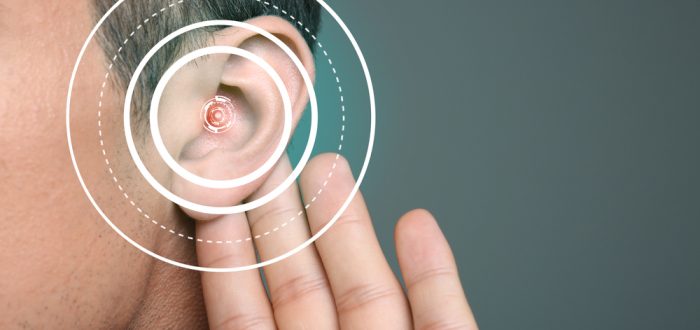Tinnitus is an annoying condition for those afflicted with it. It is the perception of sound in the absence of an external sound source, often described as a ringing, buzzing, roaring, chirping, or hissing sound. Sometimes it is temporary, such as after a concert or loud event, but for many, it is a permanent and persistent problem. The sounds produced can be caused by a variety of things. Many of the same things that cause tinnitus also cause hearing loss; so while tinnitus does not have a causal relationship with hearing loss, they are typically correlated. Read on to find out more about the link between tinnitus and hearing loss as well as treatment options.
Causes of Tinnitus
Many of the things that cause tinnitus also cause hearing loss. These possible causes include:
- Exposure to loud noises (especially if repeated or prolonged)
- Ototoxic drugs, or medications that can cause damage to the inner ear
- A blockage of earwax (usually only causes temporary hearing loss and/or tinnitus)
- Meniere’s Disease, a disorder of the balance mechanism in the inner ear
Where Does the Ringing Come From?
How does someone hear a noise that isn’t really there? It is a strange phenomenon similar to phantom pains an amputee experiences. Tinnitus usually occurs when the hair cells in the cochlea are damaged. The function of those tiny hair cells is to transmit the sounds through the neural system up to the brain for decoding. When this process isn’t functioning properly due to damage in the auditory system, the brain may perceive sounds that aren’t actually present. The perceived noise that becomes the tinnitus can be sensed in a variety of different sound qualities and/or intensities. It may also be exacerbated by external sources or conditions, including stress, stimulants, and fatigue.
Treatment for Tinnitus
Unfortunately, a cure for tinnitus has yet to be developed. However, there are some treatment options that are successful in mitigating the symptoms. Some medications that can worsen tinnitus symptoms should be utilized cautiously, including:
- Aspirin and other non-steroidal anti-inflammatory drugs like ibuprofen and naproxen.
- Certain antibiotics.
- Antimalarial drugs.
- Certain anticonvulsants.
- Cancer treatment medications.
- Loop diuretics.
- Tricyclic antidepressants.
If you are seeing your doctor or hearing care professional for tinnitus, make sure to bring a list of all medications you are taking, prescription and over the counter. The other main type of treatment for tinnitus is in the form of hearing aids or masking devices. Other solutions to help tinnitus include psychotherapy, maintaining a healthy diet and stress-free lifestyle, and treating insomnia.
Consult with the Hearing Experts at Kenwood Hearing Center
If you’d like to speak with one of our experienced hearing care professionals or get your hearing checked, we would be happy to help. Since some of our offices are currently closed, please contact us via our website in order to schedule an appointment.
